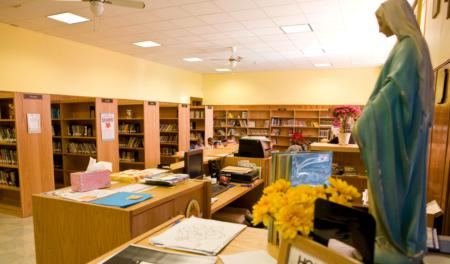Working toward heaven
At a gathering of principals, I overheard a few of them talking about baptizing new Catholics. For a moment, I didn't realize they were actually talking about children enrolled in their schools: 36 students will soon be baptized.
Joining the conversation, I discovered that the baptism of these students would also lead to the baptism of siblings and a renewed faith for their parents. The administration of the sacrament of Baptism to these students is tangible evidence of the power of our schools and their ability to evangelize.
The National Directory for Catechesis says, "Catholic Schools are vital to the Church's mission of evangelization and catechesis. They exist in order to educate the entire person: mind, body, and soul. They present the totality of the Catholic faith."
Our schools are working to provide a quality Catholic education. At the same time, our schools are accepting the challenges of a world that keeps moving forward. They are embracing their role as agents of evangelization.
To this end, educational and ministry leaders from our archdiocese have begun the process of reviewing our standards for the teaching of our faith. Under the leadership of Assistant Superintendent Martha McCook, principals and religious education leaders are studying our standards and the standards of other dioceses. Teachers, parents and religious and lay leaders are reviewing the work of this group. After this scrutiny, the results will be presented to Cardinal Sean for his review.
Remembering that standards are goals or benchmarks of what we want our students to know, understand or be able to do at the end of each grade level or course of study, it is clear that we are not developing a specific religion curriculum. Although suggestions for instruction may be provided in different areas for consideration, decisions about curriculum will remain in the hands of each school and its teachers and parents.
In addition to this work, we are also beginning the process of providing teachers with faith connections. These faith connections will provide teachers with additional information about our faith and some of the great people of our faith who have played a role in assisting society. For example, when teaching statistics, our teachers could connect that learning to our Catholic social teaching and study poverty rates. When learning about Martin Luther King and civil rights, students could also learn about Joseph Cardinal Ritter and his work to promote racial equality. Students might also learn about Catholics who helped Jewish persons while studying the horror of the Holocaust. All these faith connections will be developed and shared with our teachers. We see this work as ongoing and as a collaborative project of our teachers.
What do children learn at Catholic schools? Our students receive an education focused on faith and the classics, with a solid foundation of reading, writing, and arithmetic. But most importantly, students in our schools are learning that they can rely on prayer and each other. Children in our schools believe that they are part of God's family. They know that they are part of a Church that will be there for them. They are learning that they can turn to God at all times. They are being taught that God is good all the time. These are lessons that we want for all of our children.
Our schools are accepting their role as a place of evangelization. They are passionately working to fulfill their purpose, their mission. We are grateful for the teachers, principals and staffs that work each day to insure that our students learn these lessons. The future for our Church is brighter because of the work that happens in our schools each day.
KATHY MEARS IS THE SUPERINTENDENT OF SCHOOLS IN THE ARCHDIOCESE OF BOSTON.
- Kathy Mears is Superintendent of Catholic Schools in the Archdiocese of Boston.



















